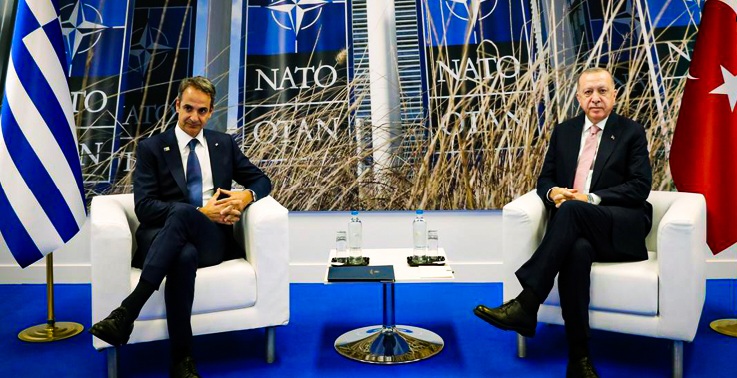Alwaght- Whereas the West claims that the NATO is the world's most united and most efficient military alliance and eliminates shadows of threat from its members, what is turning into a top threat to this military bloc is its internal gaps that even risk sparking wars between some members.
Turkey and Greece, which have been facing off each other over some islands in the Aegean Sea in recent years and their leaders are threatening each other with direct war, have widened the chasm within NATO.
Ankara and Athens relations have been strained over some Aegean Sea islands which are oil and gas-rich, and this issue has brought the two sides to the brink of a full-scale war recently.
In recent months, Turkey flew its fighter jets in a show of power near the Greek airspace and the Greece air force each time scrambled its jets in response. The verbal clash between the two countries is still ongoing and both use any occasion and platform to threaten each other. At a recent meeting of the NATO leaders in Prague, Czech Republic, they traded accusations. President Recep Tayyip Erdogan of Turkey recently in a brazen threat told the Greeks they “should take the Turkish threats seriously.... we might come suddenly one night.”
Although the Europeans invite both NATO members to exercise self-restraint in order to defuse their tensions, this difference is unfolding day by day, worrying the NATO officials.
Turkey has the largest NATO army after the US, and it is also the host of the alliance's nuclear missiles, and from this point of view, it is of particular importance to the West. But the growing disagreements about a geopolitical case in recent years have created tensions between Turkey and some European members of NATO and this gap has sharply widened after the Ukraine crisis.
US dual approach to two NATO members
Although Washington tries to pose as a neutral actor between Athens and Ankara, it has already embarked on a double-standard approach in dealing with their differences. While is easily provides F-16 fighter jets to Greece and has recently updated the country's fleet of fighters to strengthen Athens’s defense base against foreign threats, it blocked sale of these types of fighters to Ankara.
Greece even recently made a bid for F-35 stealth fighters and received affirmative initial response but Washington canceled delivery of these jets to Turkey though the latter is party to the fifth-generation jet production program. The White House suspended weapons sales to Turkey following the latter's purchase of state-of-the-art Russian S-400 air defense systems, infuriating Washington leaders. Delivering jets to one country and blocking their delivery to another demonstrates the extent of the American double standards in dealing with its two NATO allies, and by doing so, it only fuels their tensions. Turkey now has the upper hand militarily over its rival Greece and this may tempt it to take a preemptive military action.
The White House, which cannot tolerate Erdogan's unchecked acting in the region and finds his actions parallel to its policies, tries to help Greece for what it thinks can chastise Ankara. So, in the intensification of the Turkish-Greece tensions, the Americans can be very well traced— something running counter to NATO policies. NATO's fifth article suggests that an attack on one member is an attack on all members and they should scramble their support to it. But if two members fight each other, it is unclear what stance other members should take. After all, a Turkish-Greece war is NATO's internal war but the US instead of helping ease the tensions is practically adding fuel to the fire.
Managing and containing Turkey within NATO framework
For its tendency to Russia and China in recent years, Turkey has been a headache to the NATO, violating NATO charter which puts top on its agenda countering threats coming from Russia. Responding to this situation, the NATO members are trying to contain this trouble-making, recalcitrant member. Although in the beginning of Ukraine war the US needed all NATO members’ assistance to isolate Russia and so showed leniency with Turkey to get its support for anti-Russian sanctions, Ankara is now not as important as before to Washington and the Americans are not counting on its help. Still, the US tries to keep this NATO ally around but manage its actions. Because heavy pressures on Turkey risk its withdrawal from the bloc and the certain outcome is joining the Russian and Chinese-led Eastern camp. Past months made this risk clear to the West. For example, Erdogan in Shanghai Cooperation Organization (SCO) conference expressed readiness to join the Eastern economic bloc, in a message warning the Western leaders that if they excessively back Greece in its rift with Turkey, Ankara has its own cards to play and increase NATO costs.
75 years after NATO foundation, confrontation among its members is noticeable now and this can be detrimental to the West and cost its military organization its security order at a time the Western camp has united its ranks in opposition to Russia.



























